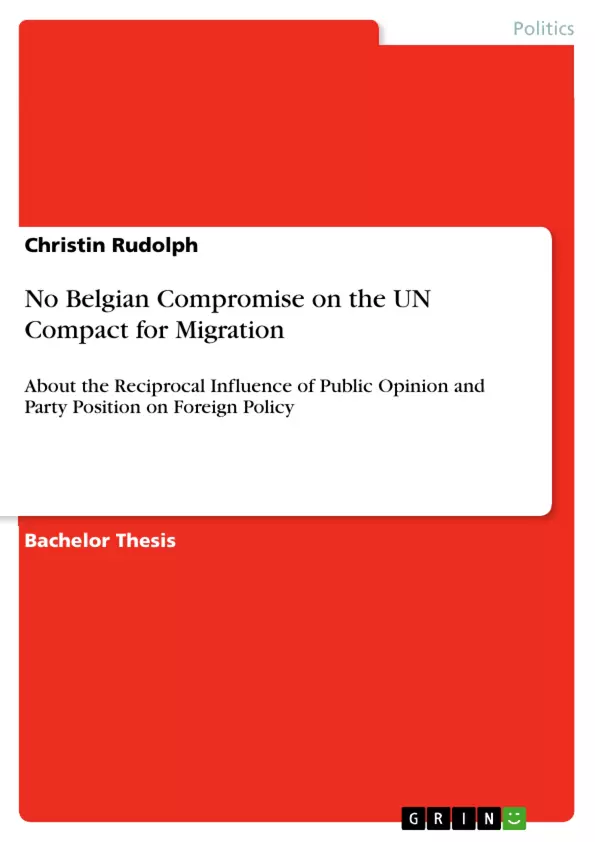Foreign policy is usually characterized by low-salience issues citizens know little about. This has important societal implications for democratic control (Endres et al. 2015). Can public opinion on such topics therefore influence elite positions? In December 2018, several countries experienced unexpected domestic tensions because of something which usually gets not much attention – the signing of a UN agreement. In Belgium, the debate around whether or not to sign the UN Global Compact for Safe, Orderly and Regular Migration (called “the Compact” here) evolved into a crisis resulting in the collapse of the government (United Nation General Assembly 2019; Lobel 2018a). What led the largest Belgian government party change its position to reject the Compact and discontinue its membership in the Belgian government? I investigate this outlier case using literature on the impact of public opinion on foreign policy and party influence on public opinion. By doing that, I examine what role the top-down influence played compared to bottom-up influence. I argue that only if an issue is salient, a party will try to represent the position of voters while citizens receive cues from the party in order to inform and persuade them. To answer the research question, I analyze both the top-down and the bottom-up process as well as what tactics and tools were used. In the conclusion I point out findings, limitations and the generalizability of this work.
Inhaltsverzeichnis (Table of Contents)
- What Matters to Citizens and Parties Might Suddenly Change ..
- Public Opinion and Party Position on Foreign Policy Issues – Bottom-Up or Top-Down?
- Consequences of a Mass-Elite Gap or Just Fishing for Votes?
- The Case of the Belgian Government Crisis 2018.
- Three Explanations for a Political U-Turn.
- Mixed Methods Approach
- Pressure From the Right, Signals From the Base, Disinformation from Everywhere – When Time-Ordering and Low-Information Environments Matter….
- H1: The N-VA used disinformation as a tool of its top-down response to losing voters in order to distract from substantive debates and discredit other parties
- H2: The N-VA got influenced by other European right-wing actors..
- H3: The N-VA got influenced by general voters' preferences on the migration issue manifested in electoral pressure
- Salience is a Necessary Condition
Zielsetzung und Themenschwerpunkte (Objectives and Key Themes)
This work examines the influence of public opinion and party positions on foreign policy decisions, specifically focusing on the Belgian government's stance on the UN Global Compact for Migration. The main objective is to investigate the interplay between bottom-up and top-down influences in this context, analyzing how public opinion impacts party positions and vice versa. Key themes explored include:- The impact of public opinion on foreign policy decisions
- The role of party influence in shaping public opinion
- The significance of issue salience in influencing both public opinion and party positions
- The interplay between top-down and bottom-up influences in foreign policy decision-making
- The use of disinformation and other tactics in shaping public discourse
Zusammenfassung der Kapitel (Chapter Summaries)
- Chapter 1: This chapter introduces the research question and context, highlighting the often low-salience nature of foreign policy issues. It then focuses on the 2018 Belgian government crisis surrounding the UN Global Compact for Migration, exploring the factors that led to the ruling party's change in position. The chapter outlines the research approach, focusing on the interplay of top-down and bottom-up influences.
- Chapter 2: This chapter reviews the existing literature on the relationship between public opinion and party positions on foreign policy. It analyzes the findings of various studies, focusing on the role of elite cues, issue salience, and the dual-process model of information exchange between citizens and elites. The chapter also discusses the impact of elite communication on public opinion, highlighting the strategic framing and priming of issues.
- Chapter 3: This chapter presents the case study of the Belgian government crisis, examining the factors influencing the ruling party's decision to reject the UN Global Compact for Migration. It explores three potential explanations, including the influence of disinformation, pressure from other right-wing actors, and the impact of public opinion through electoral pressure. The chapter analyzes the evidence for each explanation using mixed methods.
- Chapter 4: This chapter emphasizes the importance of issue salience for public opinion to have a significant impact on foreign policy decisions. It further examines how the salience of an issue can influence the interplay between bottom-up and top-down influences.
Schlüsselwörter (Keywords)
This work centers on the influence of public opinion and party positions on foreign policy, particularly in the context of the UN Global Compact for Migration. The research focuses on the mechanisms of top-down and bottom-up influences, including elite cues, issue salience, and the strategic framing and priming of issues. Other relevant keywords include disinformation, political communication, party influence, electoral pressure, and government crisis.Frequently Asked Questions
What caused the 2018 Belgian government crisis?
The crisis was triggered by a debate over whether Belgium should sign the UN Global Compact for Safe, Orderly and Regular Migration, which eventually led to the collapse of the government.
What is the main research question of this study?
The study investigates why the largest Belgian government party (N-VA) changed its position to reject the UN Compact and discontinued its membership in the government.
What role does issue salience play in foreign policy?
The author argues that only when a foreign policy issue becomes salient will a party try to represent voter positions, while also using cues to persuade citizens.
Was disinformation used by the N-VA during the crisis?
One hypothesis investigated is that the N-VA used disinformation as a top-down tool to distract from substantive debates and discredit other political parties.
How did other European actors influence the Belgian debate?
The research explores whether the N-VA was influenced by other European right-wing actors in their decision to reject the UN Compact.
- Quote paper
- Christin Rudolph (Author), 2019, No Belgian Compromise on the UN Compact for Migration, Munich, GRIN Verlag, https://www.grin.com/document/501250



